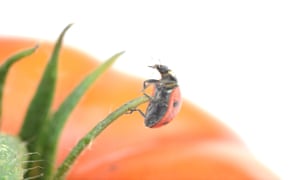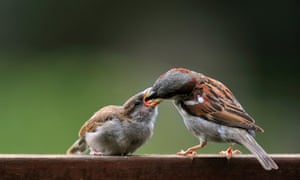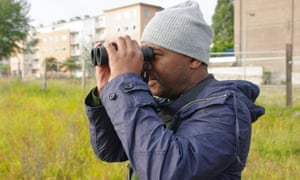Try “the snail” during a “wildlife pose” yoga session outdoors. Walk barefoot on the grass in a local park. Go on a rainbow hunt in your garden. Make bird feeders. Count moths. Dance in the rain. Turn off all your devices and enjoy the silence.
People are pledging to undertake daily “random acts of wildness” throughout June as part of a burgeoning campaign to appreciate local nature and benefit from time in green space.
With a new appreciation for neighbourhood nature blossoming during the coronavirus lockdown, more than half-a-million people are expected to sign up to the Wildlife Trusts’ 30 Days Wild campaign, which encourages daily activities throughout June to enjoy and appreciate the nature on our doorsteps.
“Our lives have been changed by coronavirus and this is giving people a reason to reflect on our relationship with nature, the way we live our lives and how we spend our free time,” said Dom Higgins, head of health and education at The Wildlife Trusts. “Precious moments outside on a daily walk help us to relax and feel happier. Even watching wildlife from a window, or on a webcam, connects us to that sense of being a part of nature, not apart from it.”
Since the annual campaign was launched five years ago 1 million people have participated. The trust supplies a free digital pack with ideas and wall charts but people are also devising their own creative ways of engaging with the natural world.
One woman left wildflower seeds in envelopes on park benches, and finders got in touch with her through the 30 Days Wild Facebook page. Another found a rope swing in her local woods and enjoyed a swing for the first time in decades.

Leanne Manchester, who has been involved with the campaign since it began five years ago, said: “Every year it has grown and grown and grown. This year, with lockdown, it feels more pertinent than ever. Everybody is realising how important nature is. It brings so much joy – that simple joy that people don’t really think about.”
Lucy McRobert, author of 365 Days Wild, said: “Too many nature narratives talk about the British countryside but overwhelmingly, people taking part in this campaign are in cities, towns and suburbs. This year it’s really chimed with people because we are actively turning to nature for comfort and solace in a very scary time – knowing that the seasons keep coming, that the swifts will return and the pigeons will keep nesting.”
A five-year review of 1,000 participants by the University of Derby has found people still reported positive effects two months after taking part. “Nature connectedness” rose by 56% and participants rated their health as 30% better.
Prof Miles Richardson, of the University of Derby, said: “What really stood out was how the people who didn’t feel a connection with nature at the outset were the ones who benefited most from taking part in 30 Days Wild.”
McRobert said little actions in nature not only benefited people’s mental and physical health, but helped them become more conscious of the biodiversity crisis and more aware of other species. She said: “A lot of little random acts of wildness can lead to something amazing.”

Some ‘random acts of wildness’
Dara McAnulty, 16, activist and author of Diary of a Young Naturalist
My favourite act of wildness has to be lying on my tummy on a patch of grass, preferably near some dandelions and other wildflowers, and waiting for insects and birds to arrive. Waiting patiently in one spot brings the wildlife to you.

Dr Amir Khan, TV GP
Definitely watching the birds at this time of year – with them bringing in the babies to show them around.
Simon Barnes, nature writer and author of On the Marsh
At some stage in June it will rain, and Eddie, my 19-year-old son with Down’s syndrome, and I will put on full waterproofs, especially waterproof trousers, take a beer for me and an apple juice for him, and step on to a Norfolk marsh to soak up the life-giving rain.
Zanna van Dijk, fitness blogger
I’ll be going “plogging” as one of my Random Acts of Wildness – combining my jog with picking up any plastic I see on my route. Good hand hygiene is a must, though.
David Lindo, ‘the urban birder’

My favourite random act of wildlife kindness is to usher flies in the house out through an open window and to not kill them on sight.
Lucy McRobert, author of 365 Days Wild
This is hard but it is very rewarding. If you’re a family with children of different ages, you can tune into nature by committing to turning off all your devices – phones, wifi, laptops, TV – for a day. It takes a bit of planning but you can go for walks, play boardgames outside if it’s fine, play charades or a build a small campfire in your garden if you have one and toast marshmallows.
Jess French, zoologist, children’s author and presenter
Me and my daughter look for mini-beasts and then thank them for the important jobs they do – worms for making soil, bees for pollinating plants, ladybirds for eating aphids.

Isabella Tree, author of Wilding
I will definitely be swimming “au naturel” in Knepp lake in June, as I’ve been doing several times a week since lockdown began. I’ve been watching the geese, swans and moorhens painstakingly building their nests and now share the swimming space with squadrons of goslings and ducklings. Evening is best – swallows, martins and swifts arcing above the water, and sometimes the white storks come in to peck at grasshoppers in the lake margins. It’s the best multi-sensory immersion in nature I can think of.